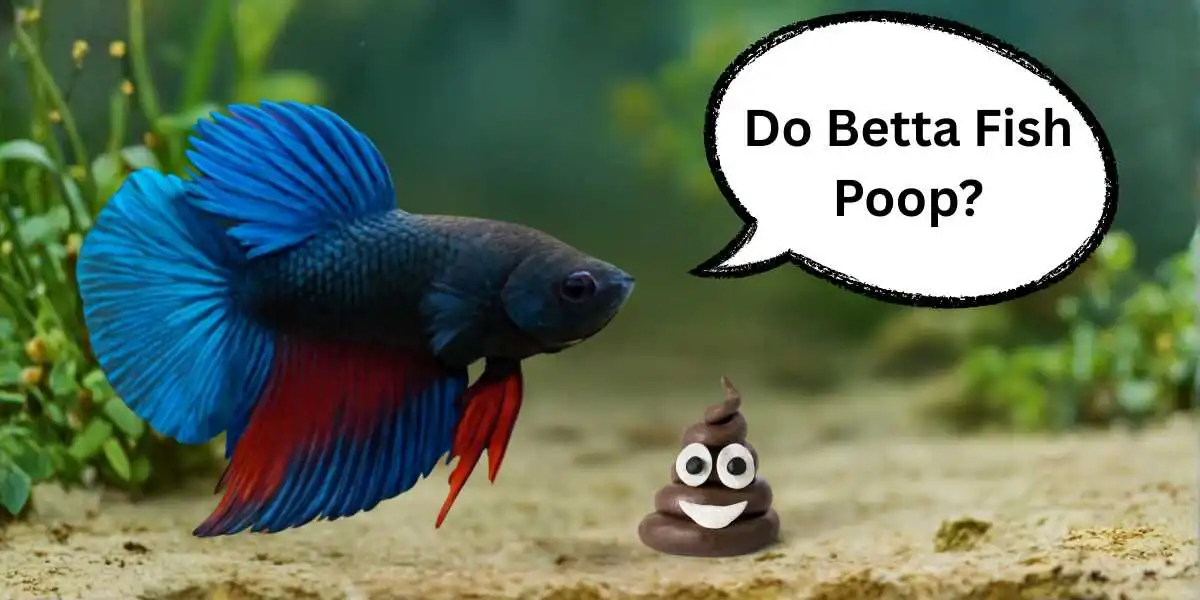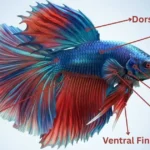Yes, betta fish definitely poop! Every living creature produces waste, and bettas are no exception. When I first started keeping bettas, I worried because I couldn’t find any waste in the tank. After careful observation, I spotted the tiny brown pellets collecting at the bottom near the plants.
Understanding how do betta fish poop and recognizing healthy betta poop helps you spot digestive problems fast. Betta fish waste management is crucial for tank cleanliness and fish health. When you know what normal betta fish poop looks like, you’ll quickly notice when something’s off. This knowledge can literally save your fish’s life.
Quick Summary: Betta Fish Poop Facts
| Topic | Key Information |
| Do bettas poop? | Yes, multiple times daily in small amounts |
| Healthy poop color | Brown to dark brown, globby texture |
| Poop location | Anus (between ventral and anal fins) |
| Frequency | Several times per day with regular feeding |
| Warning signs | White stringy poop, no poop for 3+ days, hanging poop |
| Common cause | Constipation from overfeeding |
| Treatment | Fasting 2-3 days, pea diet, daphnia |
| Prevention | Proper feeding (2-4 pellets 1-2x daily) |
How Do Betta Fish Poop?
The betta fish digestive system works similarly to other animals. Food enters through their mouth where tiny teeth break it down. According to research on fish physiology, the digestive tract processes food through several organs. Your betta’s stomach digests food before passing it into the intestine. The intestine absorbs nutrients from broken-down food.
Where do bettas poop from? The betta fish anus location sits right in front of the anal fin and behind the ventral fins. You won’t usually see this tiny opening unless you look closely. Waste exits through this anus after nutrients are absorbed. The entire betta digestive system is surprisingly short compared to herbivorous fish.
[Internal link opportunity: Link to “Betta Fish Anatomy” article here]
Bettas tend to establish bathroom areas in their tanks, often near plants or decorations. This behavioral pattern can make waste removal more predictable during maintenance. Strong water flow or active tank mates may disturb and scatter waste across the substrate.
What Does Normal Betta Fish Poop Look Like?
Healthy betta poop appears brown and globby. The color comes from what they eat. Normal betta fish poop sinks immediately to the substrate. Each dropping is small, about the size of a pellet or smaller. The texture should be firm but not hard.
Betta fish poop color changes based on diet. If you feed bloodworms, expect reddish-brown waste. Pellet-fed bettas produce darker brown poop. Green or yellowish poop happens with certain foods too. None of these colors signal problems as long as the consistency stays normal.
What’s abnormal? Stringy poop betta fish produce often indicates constipation. White poop betta fish pass may signal internal parasites. Poop stuck to your betta hanging from their anus suggests digestive issues. These warning signs need immediate attention.
How Often Do Betta Fish Poop?
How often do bettas poop? Several times daily with regular feeding schedules. You probably won’t witness every bathroom trip. Most waste accumulates at the tank bottom between cleanings. My betta fish poops right after morning feedings like clockwork.
Betta fish waste production depends on feeding frequency and amount. Fish eating twice daily produce more waste than once-daily feeders. The betta fish feeding schedule directly impacts bathroom habits. Healthy metabolism means regular waste production.
Betta fish not pooping for days signals potential problems. Constipation or illness can stop digestive processes. No visible waste for 3+ days warrants concern. Bettas refusing food won’t produce waste either. Monitor both eating and pooping behaviors together.
Betta Fish Constipation: The Most Common Problem
Betta constipation is ridiculously common among new keepers. The betta bloated stomach appearance confuses many owners. Constipated bettas struggle passing waste, leading to serious complications. Understanding signs of constipated betta helps you act fast.
Research on aquatic animal health shows constipation causes most digestive issues in bettas. Overfeeding tops the causes list. That innocent-looking betta begging for food doesn’t need six pellets per feeding. Their stomach is about the size of their eye. Betta overfeeding happens because those adorable faces trick us every time.
My betta Apollo got severely constipated when I first started keeping fish. His belly swelled noticeably and he stopped eating. I learned the hard way that less food prevents more problems. He recovered after a 3-day fast, but it scared me enough to fix my feeding habits permanently.
Signs Your Betta is Constipated
Betta fish hanging poop that trails behind them signals constipation. The waste appears stringy and pale rather than globby and brown. Betta poop stuck to their body won’t fall off naturally. These physical signs combine with behavioral changes.
Watch for these betta digestive problems:
- Bloated belly appearance
- Lethargy and reduced activity
- Swimming at weird angles
- Refusing food
- Resting at the tank bottom constantly
According to veterinary research on fish digestion, prolonged constipation causes the digestive tract to expand. This expansion presses against the swim bladder. Pressure creates buoyancy issues called swim bladder disease. Betta swim bladder from constipation is completely preventable with proper feeding.
What Causes Betta Constipation?
Several factors cause betta digestive health to decline. Dry foods like flakes and freeze-dried bloodworms expand in water. When bettas gobble pellets immediately, the food expands inside their stomach. This expansion creates blockages and discomfort.
Cold water temperatures slow metabolism dramatically. Bettas are tropical fish requiring 76-80°F water. Lower temperatures make digestion sluggish. Food sits in their gut longer, becoming harder to pass. My tank heater failed once and my betta Sage became constipated within 48 hours.
[Internal link opportunity: Link to “Betta Fish Water Parameters” article here]
Lack of fiber in commercial foods contributes to constipation. Wild bettas eat whole insects with exoskeletons providing natural fiber. Pellet-only diets lack this roughage. Low-quality foods with fillers cause more problems than protein-based pellets.
How to Help a Constipated Betta Fish
Betta constipation treatment starts with fasting. Stop feeding for 2-3 days immediately. This sounds harsh but adult bettas handle short fasts easily. Fasting betta fish allows their digestive system to clear existing waste without adding more food.
Maintain proper water temperature during treatment. Warm water (78-80°F) speeds metabolism and aids digestion. Add a mirror or another betta nearby to encourage flaring. Bettas often poop when flaring at perceived threats.
The Pea Diet Method
If fasting doesn’t work, try the pea diet for betta constipation. Frozen peas contain fiber that acts as a natural laxative. Here’s the exact process I use:
Place one frozen pea in hot water for 2 minutes. Transfer the pea to cold treated tank water until cool. Remove the pea’s outer skin completely. Feed your betta one-half of the skinless pea. Most bettas poop within 24 hours after eating pea.
Some bettas refuse peas despite multiple attempts. Soaking the pea in garlic juice sometimes helps entice reluctant fish. Don’t force-feed—stress makes constipation worse.
Daphnia for Betta Digestion
Daphnia for betta digestion works wonderfully as a natural laxative. These tiny water fleas have exoskeletons providing excellent fiber. Frozen or live daphnia work best because they contain about 89% moisture. Freeze-dried daphnia need soaking for 10 minutes before feeding.
Keeping frozen daphnia on hand helps address digestive issues quickly. Many bettas readily accept daphnia, making it an effective treatment option for constipation.
Preventing Betta Constipation and Digestive Problems
Prevention beats treatment every time. Prevent betta constipation with smart feeding practices. Feed 2-4 pellets once or twice daily maximum. Soak pellets in tank water for several minutes before feeding. This prevents expansion inside the stomach.
According to research on fish nutrition, varied diets promote better digestive health. Rotate between high-quality pellets, frozen bloodworms, brine shrimp, and daphnia. Fast your betta one day weekly to keep digestion moving smoothly. Weekly fasting mimics natural feeding patterns better than constant food availability.
[Internal link opportunity: Link to “Betta Fish Feeding Guide” article here]
Provide adequate space for exercise. Small bowls restrict movement and slow metabolism. Minimum 5-gallon tanks allow proper swimming and activity. Proper tank sizing reduces digestive issues significantly compared to undersized containers.
White Stringy Poop: Parasites or Constipation?
White poop betta fish produce confuses many owners. Long, white, skinny stringy poop may indicate internal parasites. However, white stringy poop sometimes just means severe constipation. Distinguishing between these conditions takes careful observation.
Parasitic infections cause weight loss despite normal eating. The fish appears thinner over several weeks. Constipation causes weight gain and bloating instead. Parasitic white poop appears consistently over days. Constipation-related white poop changes color after dietary adjustments.
Treatment differs dramatically between conditions. Parasites require anti-parasitic medications like API General Cure. Constipation needs fasting and dietary fiber. Misdiagnosing leads to ineffective treatment. When uncertain, consult an aquatic veterinarian for proper diagnosis.
Betta Bloating vs Dropsy: Critical Differences
Distinguishing bloating from dropsy saves lives. Both conditions cause betta bloated stomach appearance. However, dropsy is usually fatal while constipation bloating is treatable. Learning these differences is crucial for proper response.
Constipation bloating stays contained in the stomach area. The fish’s scales remain flat against the body. Dropsy causes fluid accumulation throughout the body cavity. Scales stick outward creating a pinecone appearance when viewed from above. Dropsy fish show extreme lethargy and refuse all food.
Research on aquatic veterinary medicine confirms dropsy results from kidney failure and bacterial infections. Treatment requires antibiotics like Kanamycin. Constipation responds to fasting and dietary changes. Never treat dropsy like simple constipation—the outcome is usually fatal without proper medication.
⚠️ When to Consult a Veterinarian
Some digestive situations require professional help. Contact an aquatic veterinarian if your betta shows:
- No improvement after 7 days of fasting
- Severe bloating with pinecone scales (dropsy)
- Complete refusal of food for 5+ days
- White stringy poop with weight loss
- Swimming upside down or sideways
- Gasping at the surface constantly
Board-certified fish veterinarians can diagnose conditions beyond simple constipation. Internal parasites, bacterial infections, and organ failures need expert treatment. Don’t wait until conditions become critical. Early intervention improves survival rates dramatically.
Frequently Asked Questions
Do betta fish poop every day?
Yes, healthy bettas poop multiple times daily with regular feeding. You may not see every bathroom trip because waste is tiny and sinks quickly. Consistent feeding schedules produce consistent waste production. No visible poop for 2-3 days suggests potential constipation or illness.
What should healthy betta fish poop look like?
Normal betta poop appears brown and globby with firm texture. It sinks immediately to the tank bottom. The color matches their diet—darker with pellets, reddish with bloodworms. Poop should be small, about pellet-sized or smaller, and shouldn’t hang from the fish.
Why is my betta’s poop white and stringy?
White stringy poop indicates either severe constipation or internal parasites. Constipation-related white poop improves with fasting and dietary changes. Parasitic white poop persists alongside weight loss despite normal eating. Monitor your betta for additional symptoms before treating.
How long can bettas go without pooping?
Bettas should poop daily with regular feeding. Going 2-3 days without visible waste warrants attention. After 3+ days, constipation becomes likely. However, bettas can survive weeks without food during fasting treatments, though they won’t produce waste during this time.
Can overfeeding kill my betta fish?
Yes, chronic overfeeding leads to severe constipation, swim bladder disease, and organ stress. Bloating from overfeeding presses on internal organs causing permanent damage. Feed only 2-4 pellets once or twice daily. A betta’s stomach is only the size of its eye.
Conclusion
Do betta fish poop? Absolutely, and understanding their bathroom habits keeps them healthy. Healthy betta poop appears brown and globby, sinking immediately after passing. When you spot stringy, white, or hanging poop, act fast to prevent complications. Most betta digestive problems stem from overfeeding and resolve with simple fasting.
I’ve kept bettas for years now and digestive issues remain the most common problem I encounter. Proper feeding prevents 90% of these situations. Feed small amounts twice daily, fast weekly, and watch for changes in waste appearance. Your betta’s poop tells you everything about their digestive health.
Don’t panic when you spot constipation early. Fast for 2-3 days, maintain warm water, and try the pea method if needed. Most bettas recover completely within a week. Prevention through smart feeding habits means you’ll rarely deal with serious digestive problems. Keep feeding portions appropriate—a betta’s stomach is only about the size of its eye—and their digestive system will stay healthy.
⚠️ VETERINARY DISCLAIMER
This article provides educational information about betta fish digestive health and does not replace professional veterinary care. While constipation and digestive problems are common in bettas, some conditions require expert diagnosis and treatment. If your betta shows severe bloating, pinecone scales, persistent white poop, complete loss of appetite, or any concerning symptoms, consult a qualified aquatic veterinarian immediately. Internal parasites, bacterial infections, dropsy, and organ failures need professional medical intervention. Home treatments work for simple constipation but not for serious underlying conditions. When uncertain about your betta’s health, always seek expert veterinary guidance. Early professional intervention dramatically improves treatment outcomes.
References
- Urdes, L., Walster, C., & Tepper, J. (2021). Fundamentals of Aquatic Veterinary Medicine. Wiley-Blackwell.
- Food and Agriculture Organization of the United Nations. (1984). “Digestion in Teleost Fishes.” FAO Fisheries Technical Paper.
- Lichak, M.R., Barber, J.R., Kwon, Y.M., Francis, K.X., & Bendesky, A. (2022). “Care and Use of Siamese Fighting Fish (Betta splendens) for Research.” Comparative Medicine, Vol. 72, No. 3, pp. 169-180.
- Encyclopedia Britannica. (1999). “Fish Digestion, Anatomy, Nutrition.” Britannica Online Encyclopedia.
- University of Tennessee – Department of Forestry, Wildlife and Fisheries. “Fish Physiology: Digestive System.” WFS 550 Course Materials.
- Sanders, J., DVM. (2020). “Stringy White Fish Poop: Normal or Deadly Sign?” California Aquatics Fish Veterinary Services.



